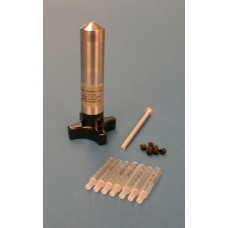- Directly macerates small samples of soft tissue (e.g., liver, muscle, brain) - without dilution with added buffers or solvent.
- Simple to operate - no need for compressed gases or high pressure electro-mechanical pumps.
- No heat, foam, or aerosols formed.
- The only parts in contact with the sample are the polypropylene cylinder liner containing a 250 micron stainless steel screen and the rubber piston seal (all disposable).
- Develops thousands of pounds/square inch to mince the entire sample. No Product is lost.
- Disposable parts eliminate cleanup and contamination between samples.
The MicroMincer is a compact, hand-operated screw press which macerates 0.3 grams or less of soft** fresh plant or animal tissue (e.g. muscle, liver, brain, epicotyl and pulpy leaf tissue) without sample loss, heat generation, foaming or aerosol problems. Much of the sample, without added buffer, is pushed through a 250 micron stainless-steel sieve under thousands of pounds force. In the case of plant tissues, fibrous, cellulosic pulp is left behind while cell juice and intracellular products are extruded. The resultant extract can be deposited directly in microtubes.
The stainless steel MicroMincer utilizes disposable polypropylene liners. Thus, multiple samples can be quickly processed without a need to clean or risk of contamination between samples.
Applications:
- Microanalysis of cellular constituents.
- Eliminates re-concentration of sample extract.
- Direct sample extraction for PAGE and agar gel analysis.
- Preparation of single-cell suspensions from tissue
** Highly fibrous animal tissue containing collegen (e.g., skin, some tumors, cartilage) cannot pass through the screen. Likewise, highly fibrous plant tissue generally can't be processed.
Much smaller tissue pieces can be obtained by maceration of tissue samples with the MicroMincer. This greatly speeds up the rate of enzymatic disaggregation and maximizes the yield of undamaged, viable cells. As an important added benefit, the MicroMincer reduces the tissue to pieces so small that diffusion of nutrients and gases are not limiting during the prolonged incubation with digestive enzymes.
- Sample is pressed at a controlled speed through a screen having 250 micron openings.
- Working capacity of 100 to 500 mg fresh, frozen or rehydrated plant or animal tissue.
- 316 stainless steel body, piston/screw and screen.
- Cylinder liner and piston seal made of polypropylene and ethylene-propylene rubber, respectively.
- All parts can be autoclaved.
- Size: 2 cm diameter, 11 cm high, weight 300g.
Ten pack of extra liner/seals
How it Works:
- Put 100 to 500 mg of tissue into the barrel of the disposable liner. It is usually not necessary to pre-chop soft tissue.
- Partially insert the piston/screw into the barrel of the liner and slide the assembly into the press cylinder.
- Screw down the press. Extract exits from the pointed end of the liner. Continue screwing down the press until all of the sample has been extracted. More pressure beyond this point will shear the plastic tip and force it out of the press cylinder. However, because the liner is a disposable item no harm is done. With very small samples, some of the extract may remain in the liner tip but can be removed with a micropipette or small spatula.
- Unscrew the press and remove the used liner and the used piston seal. The white plastic poker provided is sometimes helpful. Price on request.

